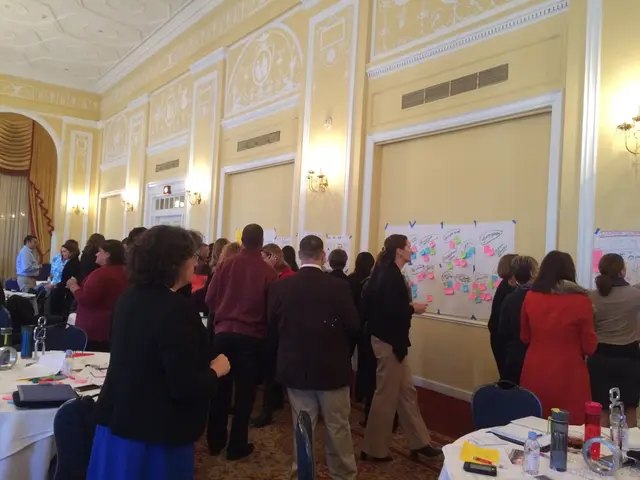Shaky Confidence in Online Truthfulness: Bitkom Study
Deceptive Data Online Seldom Gets Spotted
Berlin — Roughly a fourth of internet users in Germany feel comfortable spotting false information online, according to a survey by digital industry association Bitkom. A staggering 74% of internet users across all age groups have expressed doubt in their ability to distinguish truth from fiction on the web.
Age plays a significant role in determining one's ability to discern truthful information. Among 16- to 29-year-olds, about a third (32%) have confidence in their digital literacy, whereas only 7% of those aged 75 and above hold this belief.
Verifying Manipulated Images a Challenge
Internet users face additional difficulties when it comes to verifying the authenticity of visual content. A paltry 17% of those surveyed claimed to possess the know-how to determine whether an image or video has been manipulated. Among the youngest demographic (16-29 years old), only 22% feel competent in this area, while the over-75s manage a mere 11%.
Despite the high incidence of unverified information sharing, only 44% of respondents routinely fact-check before disseminating content online. This figure rises to 48% for the 16-29 age group, but plummets to a mere 36% for the 75-and-older group.
Bitkom surveyed 1,003 Germans aged 16 and above, including 933 internet users, for this study.
Building a Safer and More Responsible Digital Landscape
In light of these findings, Bitkom CEO Bernhard Rohleder emphasized the importance of digital competency for modern internet users. "It's essential that today's digital users can navigate the web safely and responsibly," Rohleder said. "Media literacy forms the foundation for self-determination, participation, and collaborative coexistence in the digital sphere."
Rohleder highlighted the upcoming Digital Day on June 27, a nationwide initiative with over 2,000 events aimed at expanding digital competencies, fostering digital participation, and promoting an overall understanding of digital technologies.
Germany is making substantial efforts to improve digital literacy and media literacy, including:
- Digital Strategy: Germany's current digital strategy prioritizes creating a digitally sovereign society, with a focus on nurturing digital skills across all educational institutions. This includes promoting digital literacy in information technology and programming, enabling users to critically evaluate online information[3].
- Education and Skills Development: The German Forum for Higher Education in the Digital Age seeks to improve digital education by fostering networking, skill-building, and strategy development across universities and federal states. This includes supporting the development of skills in cutting-edge fields like artificial intelligence, which can aid in identifying manipulated content[3].
- Digital Ministry: The establishment of Germany's new Digital Ministry aims to strengthen digital governance and oversight, addressing issues related to misinformation and manipulated visual content online[2][3].
- Regional and European Initiatives: Though specific initiatives focused solely on false information and manipulated visual content are not detailed, Germany's participation in programs like the European Year of Digital Citizenship Education 2025 likely includes efforts to enhance media literacy and critical thinking skills[1].
- External Collaborations: Germany's involvement in international organizations and partnerships, such as GIZ's support for digital skills in Africa, reflects a broader commitment to digital literacy, which can be adapted to address unique challenges like misinformation and manipulated content[5].
Collectively, these measures contribute to a more digitally literate population better equipped to navigate and critically assess online information.
- The survey by Bitkom highlights the importance of digital literacy, emphasizing that it is crucial for individuals to navigate the web safely and responsibly, which forms the foundation for self-determination and participation in the digital sphere.
- Among all age groups, only 17% of internet users claim to possess the knowledge to determine whether an image or video has been manipulated, underscoring the need for enhanced media literacy.
- To address this issue, Germany's new digital strategy prioritizes the creation of a digitally sovereign society, with a focus on nurturing digital skills across all educational institutions. This includes the promotion of digital literacy to help users critically evaluate online information and identify manipulated content.
- Additionally, initiatives like the German Forum for Higher Education in the Digital Age aim to improve digital education by fostering networking, skill-building, and strategy development across universities and federal states. This includes supporting the development of skills in cutting-edge fields like artificial intelligence to aid in identifying manipulated content.







